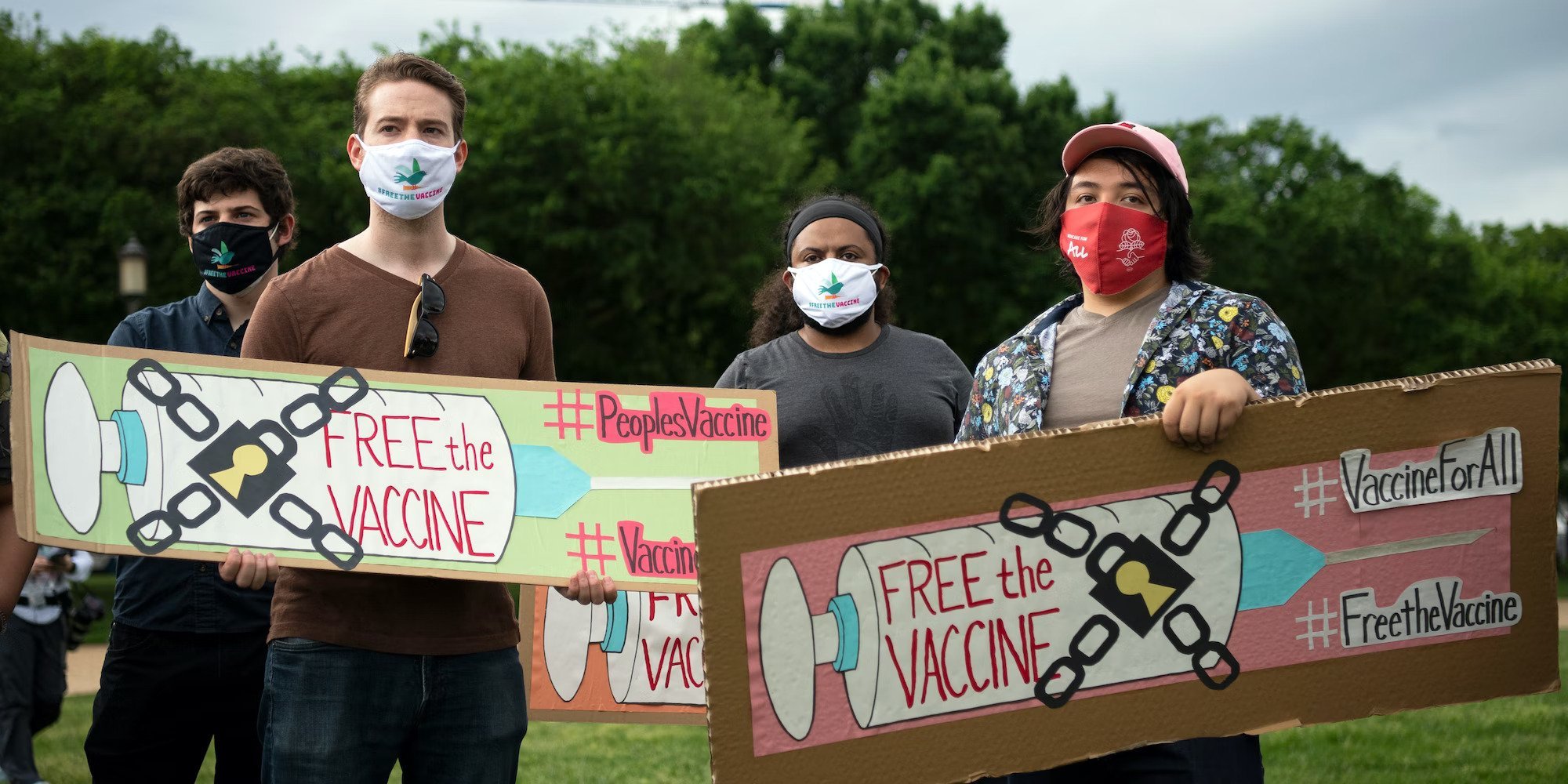COVID-19 DRUGMAKERS PRESSURED TWITTER TO CENSOR ACTIVISTS PUSHING FOR GENERIC VACCINE



Activists urge for equitable, global Covid vaccine access at the National Mall in Washington, D.C., on May 5, 2021. Photo: Caroline Brehman/Getty Images
The social media pressure campaign was just a part of the pharmaceutical industry’s successful lobbying blitz to retain patents — and make record profits.
by Lee Fang
IN MID-DECEMBER 2020, Nina Morschhaeuser, a lobbyist for Twitter in Europe, emailed colleagues with a dire warning. The drugmaker BioNTech, along with the German government, had contacted her with news of an imminent “campaign targeting the pharmaceutical companies developing the COVID-19 vaccine,” she wrote.
“The authorities are warning about ‘serious consequences’ of the action, i.e. posts and a flood of comments ‘that may violate TOS’ as well as the ‘takeover of user accounts’ are to be expected,” wrote Morschhaeuser. “Especially the personal accounts of the management of the vaccine manufacturers are said to be targeted. Accordingly, fake accounts could also be set up.”
The campaign they were concerned about was the launch of an international push to force the drug industry to share the intellectual property and patents associated with coronavirus vaccine development. Making the patents available, in turn, would allow countries across the world to swiftly manufacture generic vaccines and other low-cost therapeutics to deal with the ongoing pandemic.
Morschhaeuser, while alerting several site integrity and safety teams at Twitter, forwarded on an email from BioNTech spokesperson Jasmina Alatovic, who asked Twitter to “hide” activist tweets targeting her company’s account over a period of two days.
Morschhaeuser flagged the corporate accounts of Pfizer, BioNTech, Moderna, and AstraZeneca for her colleagues to monitor and shield from activists. Morschhaeuser also asked colleagues to monitor the hashtags #PeoplesVaccine and #JoinCTAP, a reference to the World Health Organization’s Covid-19 Technology Access Pool, a program promoted by developing countries to accelerate the development of vaccines through the equitable sharing of research and manufacturing capacity. She noted that the group Global Justice Now was spearheading the action with an online sign-up form.
It is not clear to what extent Twitter took any action on BioNTech’s request. In response to Morschhaeuser’s inquiry, several Twitter officials chimed in, debating what action could or could not be taken. Su Fern Teo, a member of the company’s safety team, noted that a quick scan of the activist campaign showed nothing that violated the company’s terms of service, and asked for more examples to “get a better sense of the content that may violate our policies.”
But it shows the extent to which pharmaceutical giants engaged in a global lobbying blitz to ensure corporate dominance over the medical products that became central to combatting the pandemic. Ultimately, the campaign to share Covid vaccine recipes around the world failed.
The Intercept accessed Twitter’s emails after the company’s billionaire owner, Elon Musk, granted access to several reporters in December. This is the second story I have reported through access to these files. The first centered on the Pentagon’s network of fake Twitter accounts used to spread U.S. narratives in the Middle East.
In reporting this story, as with the last, Twitter did not provide unfettered access to company information; rather, they allowed me to make requests without restriction that were then fulfilled on my behalf by an attorney, meaning that the search results may not have been exhaustive. I did not agree to any conditions governing the use of the documents, and I made efforts to authenticate and contextualize the documents through further reporting. The redactions in the embedded documents in this story were done by The Intercept to protect privacy, not Twitter.
Twitter did not respond to a request for comment. BioNTech’s Alatovic, in response to a request for comment, stressed that the firm “takes its societal responsibility seriously and is investing in solutions to improve the health of people regardless of their income.”
A spokesperson for the German Federal Office for Information Security, the cybersecurity agency that Morschhaeuser said contacted Twitter on behalf of BioNTech, emailed The Intercept after publication of this article to say that the agency had raised a “cyber security alert” out of concern the People’s Vaccine campaign amounted to a “DDoS attack.” The agency further claimed that this warning “independent of any content-related or political orientation of an online campaign such as the one planned here.”
The headquarters of biopharmaceutical company BioNTech on Sept. 18, 2020, in Mainz, Germany. Photo: Yann Schreiber/Getty Images
IN NOVEMBER, the Bureau of Investigative Journalism published a lengthy report showing that pharmaceutical companies went to great lengths to stifle efforts to share pandemic-related patents and IP, including threats to the leadership of Belgium, Colombia, and Indonesia. The Intercept has also detailed the domestic lobbying push to block support for a special World Trade Organization waiver necessary for the rapid creation of generic pandemic medicine. German media has similarly reported on the aggressive effort by BioNTech to build support from the German government in opposing the waiver at the WTO.
In May 2021, the Biden administration reversed its earlier position and that of the Trump administration and voiced support for the WTO waiver, making the U.S. one of the largest wealthy countries to support the idea, backed by a coalition led by India and South Africa. But infighting at the international trade body, along with staunch opposition from other wealthy countries, prevented any effective progress on the issue.
The largely successful assault against the creation of generic vaccines resulted in an unprecedented explosion in profit for a few select biopharmaceutical drug interests. Pfizer and BioNTech generated a staggering $37 billion in revenue from its shared mRNA vaccine in 2021 alone, making it one of the most lucrative drug products of all time.
Moderna, which made $17.7 billion from vaccine sales in 2021, recently announced its plan to hike the price of its Covid shot by about 400 percent.



